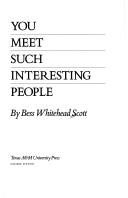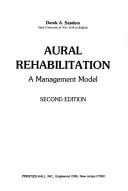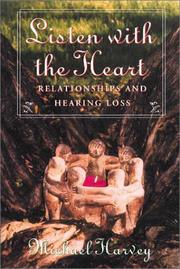| Listing 1 - 10 of 15 | << page >> |
Sort by
|

ISBN: 0585175195 9780585175195 0890964041 9780890964040 Year: 1989 Volume: no. 33 Publisher: College Station : Texas A&M University Press,
Abstract | Keywords | Export | Availability | Bookmark
 Loading...
Loading...Choose an application
- Reference Manager
- EndNote
- RefWorks (Direct export to RefWorks)
Journalists --- Hearing impaired --- Hard-of-hearing --- Hearing disorders --- Partial hearing --- Partially hearing --- People with disabilities --- Patients --- Scott, Bess Whitehead, --- Friends and associates. --- Texas --- Social life and customs.
Book
ISBN: 1597566756 9781597566759 9781597565318 Year: 2013 Publisher: San Diego, California
Abstract | Keywords | Export | Availability | Bookmark
 Loading...
Loading...Choose an application
- Reference Manager
- EndNote
- RefWorks (Direct export to RefWorks)
Self-Assessment of Hearing, Second Edition is about self-assessment of hearing loss and related dysfunctions in the various circumstances of clinical and research activity addressed to this aspect of human functioning. The author aims to display the place of self-assessment in the patchwork of audiological appraisal, argue certain positions with respect to the status and significance of self-assessment in research and clinical investigation, and challenge received positions on conceptual and nomenclatural matters.
Hearing impaired. --- Audiology. --- Hearing --- Hard-of-hearing --- Hearing disorders --- Partial hearing --- Partially hearing --- People with disabilities --- Patients --- Hard of hearing people.
Book
ISBN: 144381282X 9781443812825 1443895342 9781443895347 Year: 2016 Publisher: Newcastle upon Tyne
Abstract | Keywords | Export | Availability | Bookmark
 Loading...
Loading...Choose an application
- Reference Manager
- EndNote
- RefWorks (Direct export to RefWorks)
Deaf and hard-of-hearing students form a specific group of foreign language learners. They need to use foreign languages just like their hearing peers if they want to enjoy the same benefits of globalization and technical advancements of today, yet they cannot take part in the same foreign language education. As sign language users, lip-readers or persons relying on hearing aids or cochlear implants in their everyday communication, they need special support in learning a foreign language. This book has been written by teachers and researchers involved in teaching English as a foreign language (EFL) to deaf and hard-of-hearing students in various different European countries, including the Czech Republic, France, Hungary, Norway, Poland, and Serbia. The chapters mirror both the authors' personal journeys through this field and give insight into various aspects of empirical research into the foreign language acquisition of hearing-impaired learners. They discuss mainly the issue of specific methodology for teaching EFL vocabulary, grammar, reading, writing and speaking to deaf and hard-of-hearing persons and the challenge of effective communication during the classes via sign language, cued speech or the oral approach. Special chapters are also devoted to EFL teachers' experience in special schools for the deaf. Educators interested in practical advice, responses to challenges and worked-out solutions to problems will particularly welcome this book as a useful source of ideas. It will also help novice teachers embarking on their careers in English language education for deaf and hard-of-hearing children and adults.
Hearing impaired --- Deaf --- Deaf-mutes --- Deaf people --- Deafness --- Deafblind people --- Hard-of-hearing --- Hearing disorders --- Partial hearing --- Partially hearing --- People with disabilities --- Education --- Patients --- Hard of hearing people

ISBN: 0130532150 Year: 1982 Publisher: Englewood Cliffs (New Jersey) Prentice-Hall
Abstract | Keywords | Export | Availability | Bookmark
 Loading...
Loading...Choose an application
- Reference Manager
- EndNote
- RefWorks (Direct export to RefWorks)
Audiology --- Deaf --- -Hearing impaired --- -#KVHB:Gehoorstoornissen; therapie --- #KVHB:Audiologie --- Hard-of-hearing --- Hearing disorders --- Partial hearing --- Partially hearing --- People with disabilities --- Deaf-mutes --- Deaf people --- Deafness --- Hearing impaired --- Deafblind people --- Hearing --- Rehabilitation --- Patients --- #KVHB:Gehoorstoornissen; therapie
Book
ISBN: 9781563685293 1563685299 9781563685309 1563685302 Year: 2012 Publisher: Washington, D.C. Gallaudet University Press
Abstract | Keywords | Export | Availability | Bookmark
 Loading...
Loading...Choose an application
- Reference Manager
- EndNote
- RefWorks (Direct export to RefWorks)
Deaf --- Hearing impaired --- Communication in families --- Means of communication --- Social Welfare & Social Work --- Social Sciences --- Disabilities --- Communication in the family --- Family communication --- Deaf-mutes --- Deaf people --- Deafness --- Hard-of-hearing --- Hearing disorders --- Partial hearing --- Partially hearing --- Patients --- Families --- Deafblind people --- People with disabilities --- Hard of hearing people
Book
ISBN: 1563686457 9781563686450 9781563686443 1563686449 Year: 2015 Publisher: Washington, DC : Gallaudet University Press,
Abstract | Keywords | Export | Availability | Bookmark
 Loading...
Loading...Choose an application
- Reference Manager
- EndNote
- RefWorks (Direct export to RefWorks)
Deaf --- Hearing impaired --- Hard-of-hearing --- Hearing disorders --- Partial hearing --- Partially hearing --- People with disabilities --- Deaf-mutes --- Deaf people --- Deafness --- Deafblind people --- Legal status, laws, etc. --- Patients --- #KVHA:Taalkunde; Gebarentaal --- #KVHA:Cultuurgeschiedenis; Gebarentaal --- #KVHA:Rechten; Dovengemeenschap --- Legal status, laws, etc --- Hard of hearing people
Book
ISBN: 156368585X 9781563685859 9781563685842 1563685841 Year: 2013 Publisher: Washington, DC Gallaudet University Press
Abstract | Keywords | Export | Availability | Bookmark
 Loading...
Loading...Choose an application
- Reference Manager
- EndNote
- RefWorks (Direct export to RefWorks)
"Book presents the educational implications for deaf and hard of hearing children and offers reason-based practices for improving their English language and literacy development"-- "The difficulty that deaf and hard of hearing students have in attaining language and literacy skills has led to postulations that attribute their struggle to a developmental deficit. Recent research reveals, however, that deaf students acquire language structures, produce errors, and employ strategies in the same fashion as younger hearing students, though at later ages. The ability of all students to learn language and literacy skills in a similar manner at different stages forms the foundation of the Qualitative Similarity Hypothesis (QSH). This volume describes the theoretical underpinnings and research findings of the QSH. It presents the educational implications for deaf and hard of hearing children and offers reason-based practices for improving their English language and literacy development. This collection also stresses the critical importance of exposing educators to the larger fields of literacy and second-language learning. Providing this background information expands the possibility of differentiating instruction to meet the needs of deaf students. Deaf Students and the Qualitative Similarity Hypothesis includes commentary on the QSH for both first- and second-language English learners and reflects on how the QSH can effect a better future for all language students. "--
SOCIAL SCIENCE / General. --- EDUCATION / Teaching Methods & Materials / General. --- EDUCATION / Educational Policy & Reform / General. --- English language --- Hearing impaired --- Deaf children --- Hard-of-hearing --- Hearing disorders --- Partial hearing --- Partially hearing --- People with disabilities --- Children, Deaf --- Deafness in children --- Hearing impaired children --- Study and teaching. --- Education --- Language. --- Patients --- taal --- dove studenten --- Language --- Study and teaching --- English language Study and teaching --- Heard of hearing children
Book
ISBN: 9780197508268 0197508294 9780197508299 019750826X 0197508286 Year: 2020 Publisher: New York : Oxford University Press
Abstract | Keywords | Export | Availability | Bookmark
 Loading...
Loading...Choose an application
- Reference Manager
- EndNote
- RefWorks (Direct export to RefWorks)
The Oxford Handbook on Deaf Studies Series began in 2010 with it first volume. The series presents state-of-the-art information across an array of topics pertinent to deaf individuals and deaf learners, such as cognition, neuroscience, attention, memory, learning, and language. The present handbook, The Oxford Handbook of Deaf Studies in Literacy, is the fifth in the series, and it offers the most up-to-date information on literacy learning among deaf and hard-of-hearing (DHH) learners. Topic examined in this concise volume include the importance of language and cognition and the elements of phonological/orthographic awareness, morphosyntactic and vocabulary understanding, reading comprehension and classroom engagement, written language, learning among challenged populations, and the need to rethink our approaches to literacy research. With contributions from a well-known and highly respected field of educators and researchers, the volume will help all involved see the path each DHH child as an individual must follow if he or she is to unlock the vast world available when one has competence in reading comprehension. Too often, sweeping generalizations are made about all DHH readers—no matter their background, language(s), chosen modality(ies), and experience—from data on only a small segment of the overall population. Therefore, the editors collaborated with the authors to ensure that authors were clear about the research participants cited when making claims about specific subpopulations. This means readers can be relatively certain that statements made in this book about certain subpopulations in fact are based on data from those subpopulations.
Deaf --- Hearing impaired --- Reading --- Literacy --- Education --- E-books --- Literacy. --- Reading. --- Education. --- Illiteracy --- General education --- Language arts --- Elocution --- Hard-of-hearing --- Hearing disorders --- Partial hearing --- Partially hearing --- People with disabilities --- Education of the deaf --- Study and teaching --- Patients --- Deaf - Education --- Hearing impaired - Education

ISBN: 1581210191 Year: 2001 Publisher: San Diego (Calif.) DawnSign Press
Abstract | Keywords | Export | Availability | Bookmark
 Loading...
Loading...Choose an application
- Reference Manager
- EndNote
- RefWorks (Direct export to RefWorks)
376.33 --- Hearing impaired --- -Hearing impaired --- -Postlingual deafness --- -Family psychotherapy --- -Family group therapy --- Family therapy --- Families --- Group psychotherapy --- Marriage counseling --- Acquired deafness, Postlingually --- Postlingually acquired deafness --- Deafness --- Hard-of-hearing --- Hearing disorders --- Partial hearing --- Partially hearing --- People with disabilities --- Gehoorgestoorden: onderwijs. Doven: onderwijs --- Family relationships --- Psychology --- Psychological aspects --- Health and hygiene --- Patients --- -Gehoorgestoorden: onderwijs. Doven: onderwijs --- 376.33 Gehoorgestoorden: onderwijs. Doven: onderwijs --- -376.33 Gehoorgestoorden: onderwijs. Doven: onderwijs --- Family group therapy --- Family psychotherapy --- Postlingual deafness
Book
ISBN: 0839109938 Year: 1978 Publisher: Baltimore (Md.) : University Park press,
Abstract | Keywords | Export | Availability | Bookmark
 Loading...
Loading...Choose an application
- Reference Manager
- EndNote
- RefWorks (Direct export to RefWorks)
Deaf --- -Deaf --- -Hearing impaired --- -#KVHB:Taalontwikkeling --- #KVHB:Gehoorgestoorden --- #KVHB:Communicatie; gehoorgestoorden --- Hard-of-hearing --- Hearing disorders --- Partial hearing --- Partially hearing --- People with disabilities --- Deaf-mutes --- Deaf people --- Deafness --- Hearing impaired --- Deafblind people --- Education --- -English language --- Means of communication --- Rehabilitation --- Patients --- English language --- Education. --- Means of communication. --- Study and teaching. --- Rehabilitation. --- #KVHB:Taalontwikkeling --- Gesture language --- Speech-reading --- Speechreading --- Communication --- Education of the deaf --- Study and teaching --- Speech --- English language Study and teaching
| Listing 1 - 10 of 15 | << page >> |
Sort by
|

 Search
Search Feedback
Feedback About UniCat
About UniCat  Help
Help News
News